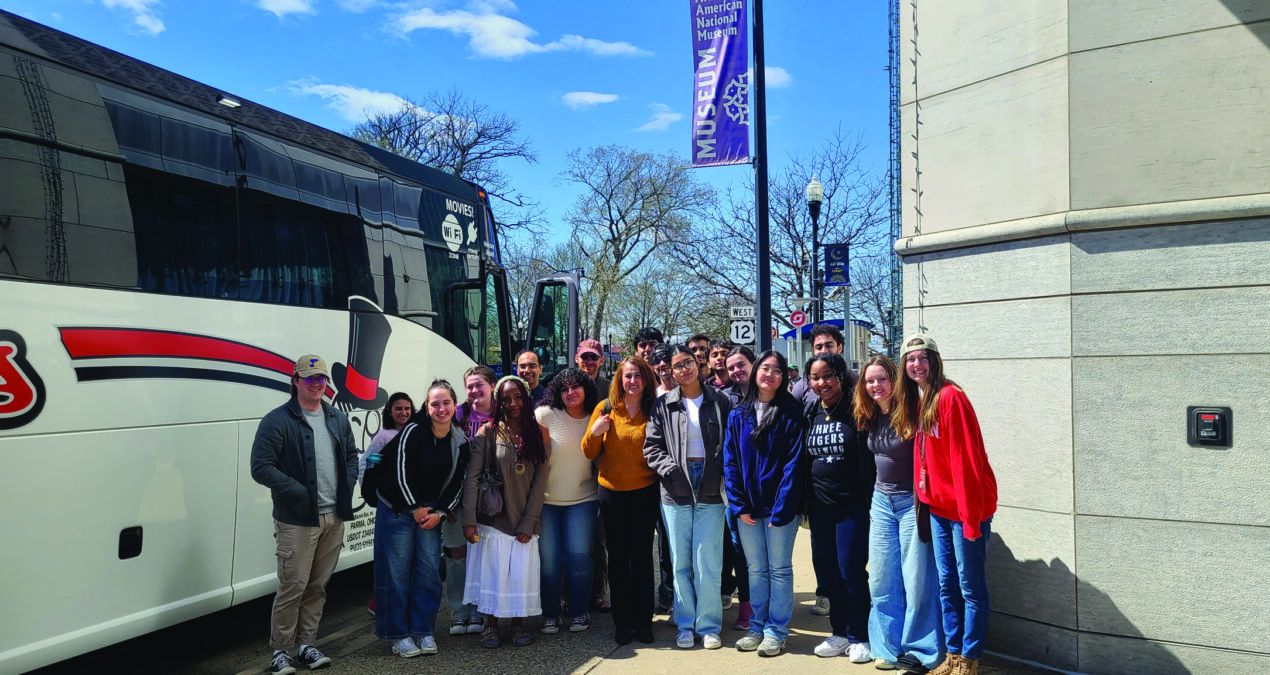Ella Kitchens, Asst. News Editor–
On April 12, students traveled with the Arabic and MENA departments to a city strikingly different from their small town of Granville.
In Dearborn, Michigan, the group visited the Arab American National Museum, ate lunch at the Lebanese Al Ameer Restaurant, and enjoyed Middle Eastern desserts at Shatila Bakery.
This annual trip originated in 2012. Dr. Hanada Al-Masri, associate professor of Arabic, was looking for activities to enrich what students learned in the classroom, and found Dearborn to be the perfect destination.
“From my research, I knew Dearborn is also called the capital of Arab Americans in the United States. And it’s within a close distance to Denison,” said Al-Masri. “So I started organizing trips with Arabic students, and then MENA students, then we started inviting others to join us to get to know Arabic language and culture.”
Upon arriving in Dearborn, students got to see the Arab American National Museum, the first and largest museum in the world for Arab American history and culture. The museum included exhibits on ancient Arab civilization, the Arab experience in America, and a collection of art.
After the museum visit, the group ate lunch at Al Ameer Restaurant, a Lebanese restaurant. Multiple courses of food were served, including pitas and hummus, baba ghanoush (roasted eggplant, olive oil, lemon juice, and seasonings), man’oushe za’atar (flatbread topped with spices including thyme), chicken shawarma, fattoush salad, a beef dish called kefta, and boneless chicken. After lunch, students ate dessert at Shatila Bakery, well known for their baklava.
“I loved the museum and getting to look around, but the food was definitely my favorite part of the trip,” said Amelia Smith ‘25. “It reminds me a lot of when we ate my grandma’s food.”
In their free time between lunch and dessert, students visited a grocery store on the same street as Al Ameer Restaurant. The store had a few marked differences from a typical American supermarket.
“Walking through the grocery store was really cool because I got to see how families interact in real time, hearing them speak in Arabic to each other,” said Sadie Frank ‘27. After nearly two semesters learning Arabic in Al-Masri’s class, Frank was able to read packages on the groceries in Arabic.
Throughout Dearborn, street names and signs on stores and restaurants are written in both Arabic and English. In addition, a newspaper in both Arabic and English is published every week in Dearborn.
“What makes this city unique is the specific culture,” said Al-Masri. “It’s like a mini-tour of the Arab world, where you can see people from diverse backgrounds: Muslims and Christians and Maronites. You can see the Lebanese and Levant and the Jordanians, the Iraqis, the Yemenis. It’s an interesting mix in terms of its demographics.”
Dearborn has a large population of Arab Americans, including second and third generation Arab Americans. This is a significant difference from Columbus, which has a much smaller Arab population.
“Even when you see people driving in the street, you see a lot of women that are covered with hijab,” said Al-Masri. “We, the people who are not wearing hijab, become the minority in this city.”
The trip is sponsored by the Patty Foresman Fund for the Modern Languages department, and funds come from the Arabic and MENA departments. However, this year, other departments joined in as well.
“This year we got generous funding from and co-sponsorship from other departments,” said Al-Masri. The international studies, global health, and global commerce department were among those who sponsored the trip.
“Global health is an interdisciplinary program, which means we are not just studying global as international and health as medicine,” said Dr. Ehab Farag, associate professor of global health.
“Visiting an Arab concentrated part of Michigan like Dearborn can give students hints about what music, what culture, what history, what beliefs people coming from the Middle East can have. And this will help them understand more about the factors behind health behaviors and health problems in the region, and the accepted interventions that we can apply.”
The trip to Dearborn makes it possible for students to observe a place they might never have been able to visit without this opportunity.
“In Granville we don’t have an Arabic-speaking community, and so it is very important for me to connect my students to an Arabic-speaking community and to Arab culture, seeing what they learn about in the classroom in actual context,” said Al-Masri.
“Just learning the language feels like isn’t enough sometimes,” said Amelia Smith, ‘25. “Being able to actually go out and experience [Arab culture] as much as we can in rural Ohio is really great.”
“These trips are important because they offer an insight beyond what you have experienced,” said Eiman Babiker ‘25. “Students should have this experience at least once in their Denison career… it’s a really good chance to see what’s beyond your scope.”

